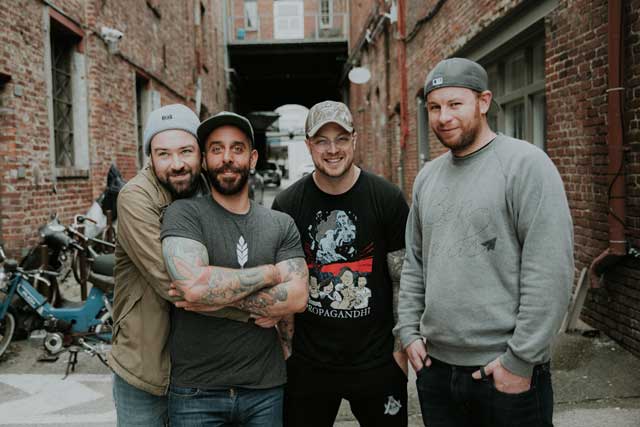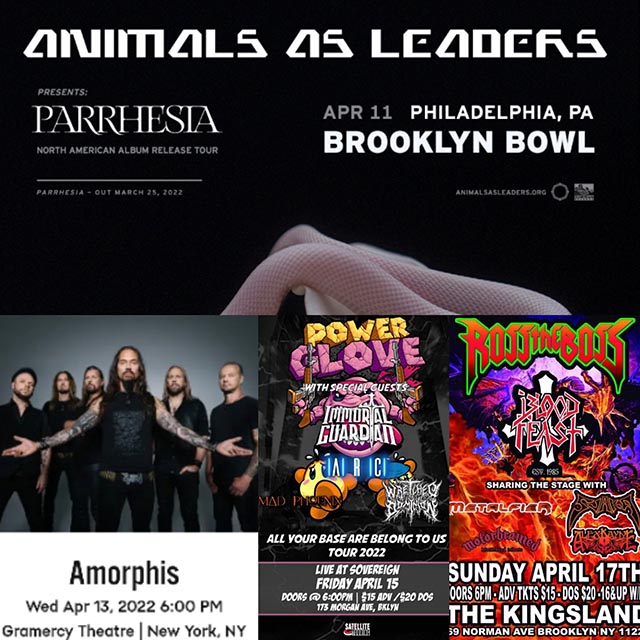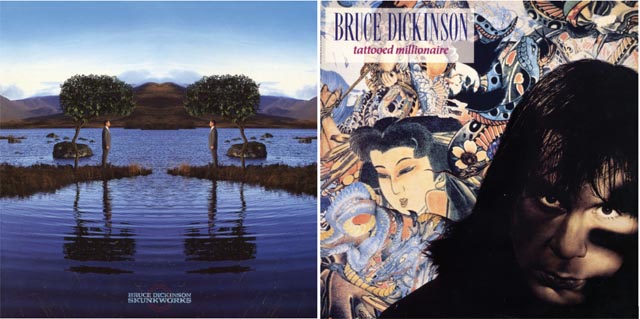 What were you doing on April 14th, 1948?
What were you doing on April 14th, 1948?
If you’re like me, you didn’t even exist yet. And to those of you reading this that did exist on that date, I hope that whatever you were doing was fulfilling and wonderful, even if you were only a newborn at the time. You likely don’t remember it though, because it’s not a date that readily stands out to most. To those that recognize it, though, it’s a date that we’re thankful to have in the history books.
April 14th, 1948 was the first day that 89.5 WSOU-FM went on the air. The brand new radio station, running from the basement of the rec center at South Orange’s Seton Hall University, was the first college FM station in New Jersey and one of the first FM stations in the entire country. Who could have known, on that day, of the monster that would one day be unleashed?
Today, WSOU is known as the only hard rock and metal station in the New York metropolitan market and one of the only full-time metal stations in the country. And as the station’s 65th anniversary approaches, we at Metal Insider want to pay tribute to our friends in the broadcasting realm that fight the good fight for metal (in addition to providing us with a good radio station to listen to while we’re working). And what better way to do that than to get the inside scoop on the station itself from former staff members?
As an alumnus of WSOU myself, I will admit that I spent most of my time at the radio station while I was attending Seton Hall, and I probably devoted more time to WSOU than I did to my studies. However, I know for a fact that many of my fellow staff members were in the same boat as me when it came to splitting time between the station and classes, and as it happens, we were just continuing a proud tradition of WSOU staff from years before.
“Like many alumni, I spent more time at WSOU than I did in a classroom during my years at Seton Hall,” says Bernie Wagenblast, who graduated from Seton Hall in 1978 and was part of the station for his entire time at Seton Hall. He goes on to state the benefits of such devotion: “There’s no substitute for doing radio, and in my four years at WSOU, I had a chance to do almost everything I would do in my professional career.”
Given what he does for work, it would seem that spending most of his time at WSOU paid off for Wagenblast. Today he owns his own voiceover and recording firm, Bernie Wagenblast Communications, LLC, and works as a traffic reporter for the famous 1010 WINS in New York City.
It was just after Wagenblast’s time at WSOU that the station started to become the metal powerhouse that it is today. According to Mark Maben, general manager of WSOU and one of only two WSOU administrators that are not students at Seton Hall, that growth came from a desire to be different and offer something that no other station could – a format that was rightfully dubbed as Modern Active Rock.
“The students themselves created the format back in 1986, when a few students got together and looked for a niche in the market,” explains Maben, a veteran of the broadcasting industry for over three decades. “Since then, the students have created an environment where they’re able to pass the torch from one generation of students to another.”
The term “generation” mean something different at WSOU than it does in the rest of the world, though. Staff members must be enrolled in courses at Seton Hall in order to remain part of the station, which means that a new group of students joins the staff each year, and those graduating from school have to sign off. But that rotation is actually a positive motivator for many, providing a good reason to maximize productivity and accomplish as much as possible, even for those that aren’t studying for a broadcasting career.
Having worked for both commercial radio stations and public radio during his career, Maben says that the youth and enthusiasm of the WSOU staff members is what sets 89.5 apart from any other station. “What’s different about WSOU is what the students bring to it. There’s always a fresh perspective. There’s always something new that the students bring to it. There are students there doing it for the pure love and pure joy of the music.”
Devotion to the music and the desire to see it become more popular are also the reasons why the station has not only survived, but thrived with a format that is not typically heard on mainstream radio, commercial or otherwise. This counts doubly so when factoring in Seton Hall’s alignment to the Catholic Church, and the restrictions that WSOU faces as a result of it. The banned band list that appeared on Reddit two months ago, which comes directly from the on-air booth at WSOU, may have been a joke to many that saw it. But for staff members that have been on the station since 2003, myself included, it’s just one of the many realities that are dealt with as part of a metal station at a Catholic university.
However, instead of complaining about such restrictions or defying them foolishly, members of the station’s management board have approached them in a professional manner at all times. Such professionalism is what allowed the station to bring back bands like Devildriver and God Forbid, following proposals made to the university in 2007 by student managers. And although you’ll never hear a Slayer song in regular rotation at WSOU, the station is always adding new music and growing its rotation. WSOU’s variety is one of its strongest assets – in a typical hour of regular rotation, you could hear a set of songs that includes Shadows Fall, Black Flag, Neurosis, Poison the Well, Hatebreed, Cro-Mags, Dark Tranquillity, Lacuna Coil, System of a Down, Napalm Death, and Opeth. By encompassing as varieties of metal as they are able, WSOU strives to cater to all of their listeners.
Through their love of music, WSOU staffers develop their own sense of family. That family often lasts beyond graduation, and eventually becomes a professional network. This gives WSOU staffers a distinct edge over other new graduates, because they already have established contacts that can provide further networking opportunities whenever needed.
 Wagenblast has maintained such a network ever since graduating. “The friendships I made at WSOU have stayed with me in the 35 years since I graduated,” he said. “Many of those friends have been professional colleagues, and our paths still cross on the airwaves. Long before I ever heard of the term ‘networking,’ WSOU gave me my first professional network, one that’s still paying dividends today.”
Wagenblast has maintained such a network ever since graduating. “The friendships I made at WSOU have stayed with me in the 35 years since I graduated,” he said. “Many of those friends have been professional colleagues, and our paths still cross on the airwaves. Long before I ever heard of the term ‘networking,’ WSOU gave me my first professional network, one that’s still paying dividends today.”
More recent graduates of the station have also utilized their professional networks to great success. George Roskos and Kurt Wubbenhorst, after graduating in 2009, founded Architekt Music together in Butler, NJ. Architekt is a threefold business venture that combines a recording studio, a music school, and a live venue within one area.
“WSOU easily made the biggest impact on my professional career out of anything I’ve ever done,” Roskos says. “Architekt Music wouldn’t exist without it. Kurt and I really became friends there and worked well together – it’s the genesis of our four-year-strong business partnership. The station taught me how to work with other people, in a real world situation on a 24/7/365 project that affected people on a daily basis.”
Architekt opened its doors officially in October 2010, after close to a year of planning and construction. In the short time they’ve been open, the studio has produced albums from nationally-known groups like Sevendust and Call Me No One, in addition to records numerous local and underground groups. The live venue has hosted concerts for nearly every genre of music, and the school hosts hundreds of students during the course of each week. Roskos credits WSOU for enlivening his education at Seton Hall and motivating him to do something different with his career.
“Without WSOU my Seton Hall educational experience would’ve been pretty bland and uninspiring,” he explains. “I accidentally found it, as I did Seton Hall itself, and I absolutely find the station to be entirely responsible for all of the defining moments of my four years at the school. I owe a lot to WSOU and am so proud to have been a part of its history for a few years.”
Other graduates of WSOU used their professional networks specifically to remain active in the world of metal, such as Anthony Delia. After graduating in 1999, Delia pursued and found a career with Atlantic Records.
“My time at WSOU was full of discovery,” he says. “The relationships that I built through WSOU helped me land my first gig in the music business with Atlantic Records, where I still work today.”
Now, Delia is the VP of Marketing at Atlantic and Roadrunner, and works with high-caliber metal acts like Killswitch Engage, Gojira, and Stone Sour on a daily basis. Not many can say that they get to live that particular dream of being surrounded by metal 24/7!
Above all else, though, WSOU is an extension of Seton Hall University, in that it is a place to learn. Many may not realize that there is a lot more that goes into a radio broadcast than just playing songs and talking into a microphone. The technical knowledge and communication skills required to orchestrate a successful broadcast are immense in scope. WSOU teaches those things, and so many others, that carry over into the post-graduation world.
“I can’t begin to tell you the joy I experienced learning to ‘hear’ a promo campaign in my head, script it, direct fellow WSOU staffers to deliver the performances I needed, and then combine those performances with the music and sound effects that resulted in a final spot or program,” says Steve Pender, another graduate from 1978. “The experience was not only satisfying and personally rewarding; as a matter of fact, I won my very first award for radio production while at WSOU.”
Pender, like Wagenblast, owns his own business now. He also cultivated the necessary skills while at WSOU, but his focus was in a different area.
“Through my company, Family Legacy Video, Inc., I help individuals, families, and organizations preserve, celebrate, and share their life stories on video,” he explains. “The connection between my experiences at WSOU and the work I’ve done since is a direct one; I’ll always be grateful for the creative freedom and opportunities I found at 89.5 FM.”
These are just some of the many things that make WSOU more than just a radio station. For the students that pass through the station each day, it is a way of life that is unique to them alone. For alumni, such as myself, it is a place of fond memories, incredible learning, and camaraderie that is unlike any college group or club. And for the listeners, it is the best way for them to get their dose of heavy metal.
Looking to the future, WSOU is taking steps to ensure that it stays viable in the digital media age. Listeners can already stream 89.5 on iHeartRadio, which already gives a level of accessibility that most college stations can’t even dream of. Maben says that even more exciting ventures on the streaming front are just over the horizon, via a partnership with a “business incubator” at the New Jersey Institute of Technology (NJIT).
“We’re going to be able to offer our listeners some very exciting options in terms of the mobile environment and the internet environment,” Maben proclaims. Although details are still being worked out, as the project is in its early stages, Maben says that WSOU will offer “ease of access that commercial stations can’t offer.”
With these future endeavors driving them forward, and the metal community supporting them each step of the way, the future of WSOU looks bright. Here’s to another 65 years of 89.5! Thanks for always bringing us The Loudest Rock!











